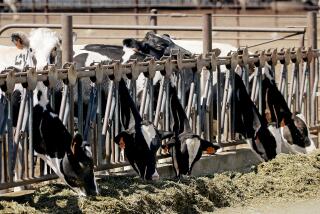Cow tail, cow pie: Fury in Colorado over possible ‘docking’ ban
Colorado farmers are in udder disbelief.
The state’s legislators are considering a new law that would ban farmers from taking away natural fly swatters from their dairy cows. Some want to ban dairy operations from carrying out a process called docking -- cutting cattle tails for sanitary reasons.
Critics call it animal cruelty. Farmers say it produces more sanitary milk by keeping the tail from dragging in mud and manure.
Not only that, but many farmers complain that the practice is rare in their state, so what’s the big deal? They also don’t want what they consider unwanted government intrusion on their farms.
“We’re starting to be made criminals on our own farms,” farmer Chris Kraft, who does not tail dock his herd, told the Associated Press. “It’s just outrageous.”
The Colorado Farm Bureau also thinks legislators should mind their own business.
“At the farm bureau, we don’t endorse the practice, but we don’t think any ban should be set in stone by way of a law,” Brent Boydston, the bureau’s vice president for public policy, told the Los Angeles Times. “Once a ban is law, it takes away flexibility and innovation. Let the farmers and ranchers manage their livestock as they see fit.”
Most farmers dock their cows with a tight rubber ring that after several weeks cuts off circulation, causing as much as two-thirds of the tail to just fall off.
The bill, sponsored by Rep. Steve Lebsock, a Democrat from the Denver suburb of Thornton, would ban tail docking except when performed by a veterinarian and when using anesthesia.
But research has found tail docking doesn’t make milk or workers safer, and the practice has been denounced by the National Milk Producers Federation, the Humane Society of the United States and the American Society for the Prevention of Cruelty to Animals, among others. They argue tail docking is painful and unnecessary.
As many as half of U.S. farms cut the tails of at least some of their cows. But California, Rhode Island and New Jersey have banned tail docking. Ohio will stop the practice in 2018.
“The process became popular in the 1970s when research in New Zealand showed if docked cows produce cleaner milk, few tails dragged through the muck, fewer pathogens were transferred to the udder and into the milk,” Boydston told The Times. “But later research contradicted all that.”
Last year, milk producers group urged farmers to phase out the practice within 10 years, allowing them time to upgrade housing or milking facilities that don’t work with long tails.
But old habits die hard.
“People like to do what they’ve always done,” Boydston said. “I’m sure some journalists still use typewriters. It’s the same with farmers.”
ALSO:
Late-winter snowstorm threatens Northeast
Suspect in hit and run that killed family returned to Brooklyn
Idaho law banning abortions after 20 weeks ruled unconstitutional
More to Read
Sign up for Essential California
The most important California stories and recommendations in your inbox every morning.
You may occasionally receive promotional content from the Los Angeles Times.











